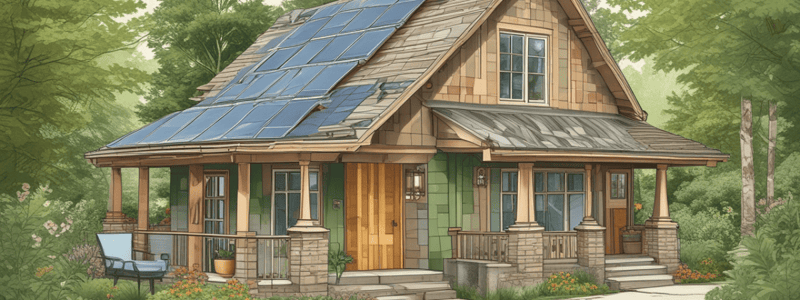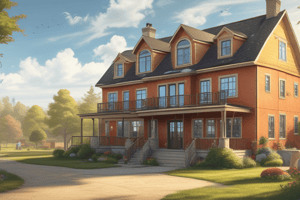Podcast
Questions and Answers
What is the primary advantage of living in an energy-efficient home?
What is the primary advantage of living in an energy-efficient home?
- Improving the resale value of your home
- Keeping your family comfortable and reducing utility bills (correct)
- Increasing your utility bills
- Reducing your household's carbon footprint
What is a recommended step to conserve energy when you have multiple electronic devices grouped together?
What is a recommended step to conserve energy when you have multiple electronic devices grouped together?
- Plug them into a power strip and turn the entire power strip off (correct)
- Turn off each device individually
- Unplug each device individually
- Leave them on to avoid the hassle of restarting
What is the purpose of the ENERGY STAR program?
What is the purpose of the ENERGY STAR program?
- To promote the use of more energy-intensive appliances
- To reduce the cost of manufacturing energy-efficient products
- To encourage the use of renewable energy sources
- To promote superior energy efficiency and protect the environment (correct)
What should you do with seldom used appliances, such as an extra refrigerator?
What should you do with seldom used appliances, such as an extra refrigerator?
What is an alternative to turning off your computer when you're not using it?
What is an alternative to turning off your computer when you're not using it?
What is the main difference between energy conservation and energy efficiency?
What is the main difference between energy conservation and energy efficiency?
Why is it a good idea to unplug battery chargers and power adapters when not in use?
Why is it a good idea to unplug battery chargers and power adapters when not in use?
What is the recommended thermostat setting in winter for the hours you are home and active?
What is the recommended thermostat setting in winter for the hours you are home and active?
What is the primary purpose of a programmable thermostat?
What is the primary purpose of a programmable thermostat?
Why should you open your curtains in the winter months?
Why should you open your curtains in the winter months?
What is the recommended temperature setting for your hot water heater?
What is the recommended temperature setting for your hot water heater?
What is the purpose of a home energy audit?
What is the purpose of a home energy audit?
What can be done to prevent energy loss through the ceiling of your home?
What can be done to prevent energy loss through the ceiling of your home?
Why should you replace old windows with ENERGY STAR qualified windows?
Why should you replace old windows with ENERGY STAR qualified windows?
What is the recommended level of ceiling insulation to cut heating and cooling costs?
What is the recommended level of ceiling insulation to cut heating and cooling costs?
Flashcards are hidden until you start studying
Study Notes
Home Energy Conservation
- Conserving energy and incorporating energy-efficient home improvements can save money and lower household carbon footprint.
Save Electricity
- Turning off and unplugging unused devices can conserve energy and save money.
- Plug multiple electronic devices into a power strip and turn off with one click when not in use.
- Unplug seldom-used appliances, battery chargers, and power adapters when not in use.
- Set computers to hibernate mode to save electricity.
- Look for ENERGY STAR certified products, which promote superior energy efficiency and save energy.
Save on Heating and Cooling
- Heating and cooling account for the biggest portion of most homes' energy consumption.
- Install a programmable thermostat to adjust heating and cooling needs automatically.
- Program thermostat to 68°F in winter and 78°F in summer to save energy.
- Open curtains in winter to let natural sunlight warm the home, and close at night to minimize heat loss.
- Close curtains in summer to keep the sun's heat out and lessen the burden on the air conditioner.
- Maintain heating and cooling systems by cleaning and replacing air filters regularly and arranging for annual maintenance.
Save on Hot Water Costs
- Take shorter showers to save on hot water costs.
- Install low-flow showerheads to reduce hot water usage.
- Check and set the thermostat on the hot water heater to 120°F to reduce water heating costs.
Prevent Energy Loss
- Inspect the home for common energy leaks to prevent energy loss.
- Check windows for drafts and install weatherstripping to seal up leaks.
- Replace old windows with ENERGY STAR qualified windows to cut energy bills by up to 15%.
- Increase ceiling insulation to a higher R-value (up to R-38) to prevent energy escape.
- Consider having a professional home energy audit performed to identify energy leaks and improve energy efficiency.
Studying That Suits You
Use AI to generate personalized quizzes and flashcards to suit your learning preferences.




